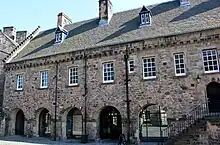 | |
| Coordinates | 55°56′55.5″N 03°12′05.7″W / 55.948750°N 3.201583°W |
|---|---|
| Visitors | 805,934 (2019)[1] |
| Website | www.nms.ac.uk/war |
The National War Museum is a museum dedicated to warfare, which is located inside Edinburgh Castle in Edinburgh, Scotland. Opened in 1933 in a converted 18th-century ordnance storehouse, the museum is run by the National Museums Scotland and covers 400 years of Scotland at war from the 17th century through permanent exhibits and special exhibitions.[2]
It was formerly known as the Scottish United Services Museum,[3] and prior to this, the Scottish Naval and Military Museum.
Location and description
The museum is located in the Hospital Square of Edinburgh Castle, within the Old Town area of Edinburgh, Scotland.[4] The building, which has been category-B listed since 1970, comprises two storeys with a ten-bay rectangular-plan.[5] It is managed by National Museums Scotland.[4] Admission to the museum is included in the entry charge for the castle.[6]
The museum's collection includes items used by Scotland's armed forces over many centuries. These include broadswords from the Scottish Highlands, protection against chemical warfare, and letters sent home from combat by personnel. It also houses a gallery, with works such as The Thin Red Line by Robert Gibb, and a library.[4]
History
Various movements proposing museums dedicated to warfare arose during World War I, and the consensus amongst those involved was that they should be regional in nature. Preliminary ideas for a Scottish museum were drawn up in 1917 by Alexander Ormiston Curle, curator of the National Museum of Scotland, under advice from organisers in London, as well as a civic committee of the Edinburgh council, set up by Lord Provost John Lorne MacLeod.[7] John Stewart-Murray, 8th Duke of Atholl, was also a supporter of the idea. The committee worked through 1918 and 1919 on ideas for the museum, including plans for procuring exhibits. After the end of the war, however, priority was given to the construction of the Scottish National War Memorial, which opened in 1927, and the museum project was put on hold.[8]
The museum project was resurrected in the late 1920s by the Duke of Atholl,[8] utilising a building inside Edinburgh Castle which was built in the 1748 by William Skinner as a storehouse for ordnance.[5][4] Construction took more than three years,[9] and the museum was opened by Lord High Commissioner John Buchan on 23 May 1933 as the Scottish Naval and Military Museum.[10]
In 1949, recognising the importance of the Air Force to the war effort in World War II, the museum was renamed to the United Services Museum.[11] The museum was refurbished in 2000, and upon reopening was renamed to its present name of the National War Museum.[12]
See also
References
- ↑ "ALVA - Association of Leading Visitor Attractions". www.alva.org.uk. Archived from the original on 7 March 2012. Retrieved 23 October 2020.
- ↑ Li, Martin (30 May 2017). Adventure Guide to Scotland. Hunter Publishing, Inc. p. 41. ISBN 9781588434067. Archived from the original on 26 January 2023. Retrieved 26 January 2023.
- ↑ Wright, Christopher; Gordon, Catherine May (2006). British and Irish Paintings in Public Collections: An Index of British and Irish Oil Paintings by Artists Born Before 1870 in Public and Institutional Collections in the United Kingdom and Ireland. Yale University Press. p. 30. ISBN 0300117302. Archived from the original on 26 January 2023. Retrieved 26 January 2023.
- 1 2 3 4 "National War Museum". Edinburgh Castle. Retrieved 3 March 2020.
- 1 2 "Edinburgh Castle, National War Museum of Scotland (Former Hospital and Ordnance Store), Including Sentry Boxes and Urns". British Listed Buildings. Retrieved 3 March 2020.
- ↑ "Plan Your Visit". National Museums Scotland. Retrieved 3 March 2020.
- ↑ "War Museums - Edinburgh's Part in a New Movement". The Scotsman. 7 March 1917. p. 8. Retrieved 26 January 2023.
- 1 2 Jennifer Wellington (2017). Exhibiting War: The Great War, Museums, and Memory in Britain, Canada, and Australia. Cambridge University Press. pp. 252–253. ISBN 9781107135079. Archived from the original on 26 January 2023. Retrieved 26 January 2023.
- ↑ "The Preparation of the Scottish Naval and Military Museum". Dundee Evening Telegraph. 29 March 1933. p. 6. Retrieved 26 January 2023.
- ↑ "The Day's News In Brief - Local and District". Aberdeen Press and Journal. 23 May 1933. p. 6. Retrieved 26 January 2023.
- ↑ "Edinburgh Castle". HISTORIC ENVIRONMENT SCOTLAND. p. 7. Retrieved 3 March 2020.
- ↑ "History of National Museums Scotland". National Museums Scotland. Archived from the original on 3 March 2020. Retrieved 3 March 2020.
.jpg.webp)